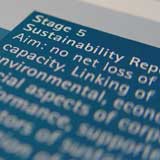Downwave 2 (1992-1998)
Downwave 2 set in shortly before the UN Earth Summit in Rio
de Janeiro. Several people from SustainAbility went to the Summit: Julia
Hailes, Dr Vernon Jennings and Geoff
Lye (though Geoff, then at Countrywide Communications, wouldn't join formally
us until 1995). I, instead, went to Yokohama and Tokyo. The Summit set some
useful benchmarks in terms of climate change and biodiversity, but once again
the political steam was bleeding out of the system.
Many of our old activities continued in this period. I continued
to edit Biotechnology Bulletin, albeit now spending just one weekend
a month on the task. Julia and I continued to write books together, including
Manual 2000
(1998) and The New Foods Guide (1999). Such projects involved extended
working stints with Julia at her family home, Tintinhull House, Somerset,
owned by the National Trust.
SustainAbility continued to evolve. Geoff Lye had joined as
a director, and some time later two early directors moved on: Julia Hailes
to have children and work independently from Somerset (she remains a member
of SustainAbility's Council) and Dr Vernon Jennings (also now a SustainAbility
Council member and, until recently, a vice-president at Novo Nordisk).
SustainAbility moved from auditing to reporting, publishing
a series of reports that helped define the international corporate reporting
agenda. The work has been undertaken in close partnership with the United
Nations Environment Programme (UNEP) and a range of other organisations. A
key publication, laying the foundations for much of what followed, was Coming
Clean, developed with Deloitte Touche Tohmatsu International (DTTI) and
the International Institute for Sustainable Development (IISD), and published
in 1993. This project alliance came about because of a conversation with our
next-door neighbour, South African Eggie Koch, who worked for DTTI.
The next quantum jump came with Engaging Stakeholders,
published in 1996, in which I, Andrea Spencer-Cooke
and other colleagues map out the emerging reporting and stakeholder engagement
agendas.
Andrea was also instrumental in my development of the triple
bottom line concept, a phrase I coined in 1994. The idea was that business
created - or destroyed - economic, social and environmental value. My first
publication on the theme appeared in The California Management Review
in 1994, with Engaging Stakeholders sketching in more of the detail
in 1996. But the full account of the triple bottom line concept and agenda
would appear the following year, 1997, in the form of Cannibals
with Forks. The book, which was short-listed for the Financial Times/Booz-Allen
Hamilton Best Business Book Award, had an extraordinary impact.
Building on work we had done during early phases of our development,
we got involved in a huge number of stakeholder engagement processes, often
facilitating them, sometimes participating as stakeholders.
In the same way that our relationship with Novo Nordisk was
a defining one for us in the early 1990s, our relationship with Shell was
the defining one in the late 1990s. Following the Brent Spar and Nigeria crises
of 1995, we had refused to work for Shell for two years, despite top-level
requests to do so. When we finally did engage, we helped on many fronts -
including the development of The Shell Report, an annual series of
sustainable development reports - and remain involved today.
To ensure we kept up to date with NGO issues and concerns, we
carried out a series of NGO surveys during this period. These began with The
Green Wave (1990), then moved on to The Corporate Environmentalists
(1991), The Green Keiretsu (1994) and, probably the most influential
of the lot, Strange Attractor - which I wrote with Shelly
Fennell in 1996. The work was originally commissioned for the board of
BP, which then allowed us to publish it. This strand of our work continues
into the third downwave period, with our work on 'The
21st Century NGO' (2002-2003).
